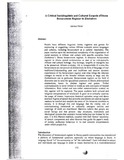Please use this identifier to cite or link to this item:
https://cris.library.msu.ac.zw//handle/11408/1497| Title: | A critical socilinguistic & cultural exegesis of Shona bereavement register in Zimbabwe | Authors: | Viriri, Advice | Keywords: | Sociolingulstic | Issue Date: | 2011 | Publisher: | National University of Lesotho | Series/Report no.: | Proceedings of the 10th LASU Conference, Roma, Lesotho, 25-27 November 2009 : language contact, identity and socio-economic mobility/ edited by Alison Love [et al.; | Abstract: | People have different linguistic forms, registers and genres for expressing or suggesting various African concepts across languages and cultures, including bereavement as a cultural imperative. The paper touches upon the institutional complexity of the organisation of social memory in African oral culture with specific examples from Zimbabwe's Shona bereavement register. It discusses bereavement register in Shona speech communities us part of an indispensable African oral cultural heritage. Any heritage, tangible or intangible has to be preserved. Almost everyday, life is insupportable if events like bereavement are not perceived distinctively in form of language of oral traditions.Understanding past oral traditions and present dynamic experiences of the bereavement register and what brings the inherent changes is crucial to the broader African society at large and the Zimbabwean one in particular. Bereavement register, as the field of discourse can be used for specialised purposes in Shona philosophical abstractions, hence its distinct register and genres. Verbal communication is never limited to words as sole conveyers of funeral information. Both verbal and non-verbal communication centred on this register will be explored. The paper explains both cultural and religious interpretations of witchcraft. It goes on to critically examine the usage of totems, impromptu theatrical episodes, songs and dance and how figures of speech like proverbs and idioms arc used as register markers to comfort and condole the souls of the bereaved members in society. It is through this oral language that the vitality role of communicating intentional or culturally emergent entities and meanings of death are manifested. Marxists believe that people are social beings and that present -day structures, institutions and ideological systems that underpin human behaviour arc formed by the past. It is this Marxist tradition, coupled with Dell Hymcs’ taxonomy of speech components and other theories that guide the paper’s study of society and human behaviour in its real concrete circumstances under which people live. | URI: | http://hdl.handle.net/11408/1497 | ISBN: | 978-999116790-9 |
| Appears in Collections: | Book Chapters |
Files in This Item:
| File | Description | Size | Format | |
|---|---|---|---|---|
| critical sociolinguistic.pdf | Abstract | 601.29 kB | Adobe PDF |  View/Open |
Page view(s)
24
checked on Sep 1, 2024
Download(s)
8
checked on Sep 1, 2024
Google ScholarTM
Check
Altmetric
Items in MSUIR are protected by copyright, with all rights reserved, unless otherwise indicated.


